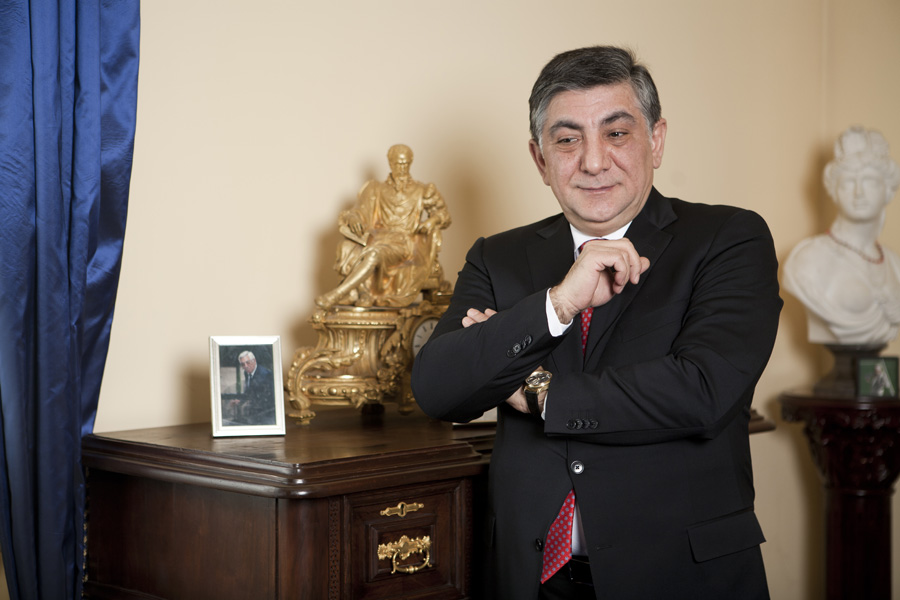By Andranik Aboyan
Khachatur Sukiasyan a man whose bank account has seen more state money than some ministries has once again opened his mouth to remind the country who really gets to speak in Armenia. This time, it was to scold the tens of thousands of Artsakh refugees for not putting up enough of a fight when Azerbaijan launched a full-scale assault on their homeland in September 2023.
“They didn’t fight,” Sukiasyan proclaimed, as if Artsakh’s residents had packed up their lives and left their ancestral homes on a whim, like skipping a bad concert halfway through. When informed that hundreds of Artsakh Armenians were killed in the 24-hour attack, Sukiasyan simply dismissed the facts: “You’re lying… Only ten people [died].”
Even for a seasoned capitalist with a long track record of dodging accountability, this was a new low. Facing backlash, he offered a brief apology and then, true to form, lashed out at journalists. “I apologized. Get out of here,” he snapped, caught between arrogance and damage control.
But Sukiasyan’s remarks weren’t just tasteless. They were part of a larger narrative a disturbing trend among the political allies of Prime Minister Nikol Pashinyan to shift blame for the loss of Artsakh onto the very people who paid the highest price. The implication is clear: if you’re displaced, grieving, or impoverished, it’s probably your fault. You should’ve fought harder, prayed louder, or maybe pulled yourself up by the bootstraps you didn’t have time to grab while fleeing artillery fire.
This brand of rhetoric would be laughable if it weren’t coming from someone who’s directly benefited from every administration since the late 1990s. Sukiasyan has held a seat in parliament under multiple administartions, all while his business empire has ballooned with the help of you guessed it lucrative government contracts. Since Pashinyan’s so-called “revolution,” Sukiasyan’s companies have gobbled up state tenders like they were canapés at a government gala. When it comes to wartime sacrifice, Sukiasyan and his family have risked nothing but the occasional bad press.
And yet, it’s the working poor and displaced families he chooses to lecture those scraping by on a few dollars of state assistance, many of whom have lost homes, relatives, and entire communities. Oligarchs like Sukiasyan howl at the notion of subsidized rent for refugees, yet line their pockets with inflated procurement deals and sweetheart privatization schemes. They snatch up public property for pennies on the dollar, then turn around and accuse the destitute of being a burden on the state. It’s kleptocratic theater at its finest: moral lectures from men who’ve made a career of bleeding the nation dry, all while polishing their patriotic credentials on borrowed dignity.
Perhaps the most revealing part of his outburst isn’t just the contempt for the displaced, but the sheer cluelessness of a man who has spent too long hearing yes-men and not enough time outside of luxury boardrooms. Sukiasyan speaks about survival and resistance as if he’s watched a war movie once and took away the wrong lesson. In his world, the defense of Artsakh should have looked more like a Marvel film than a desperate, outnumbered last stand.
And yet, nearly 4,000 Armenian soldiers died in the 2020 war many of them young, many from Artsakh. But the narrative now being fed to the public is one where these men, their families, and their homeland simply didn’t try hard enough. They’d rather attack the survivors than ask hard questions about why Pashinyan pulled out of peace talks in 2018, why his government purchased weapons with no accompanying ammunition, and why he gave the greenlight to Azerbaijan to attack with his Prague declaration in 2023.
Sukiasyan’s comments come not long after he warned that critics of the government might lose their “freedom, assets, and even lives” a remark so cartoonishly authoritarian it might have been scribbled on the back of a Bond villain’s napkin. While the Civil Contract party quickly distanced itself from the comment, it’s hard to ignore the pattern: intimidation, deflection, and a quiet erasure of national responsibility.
The real tragedy here isn’t just the loss of Artsakh, but what it revealed: that Armenia’s political elite, wrapped in imported suits and fueled by foreign capital, are more interested in silencing the grieving than learning from them. Sukiasyan is not merely offensive he’s emblematic of a deeper rot. He represents the class of men who mistake privilege for patriotism and whose sense of sacrifice begins and ends with a tax write-off.
But history does not forget those who plunder while their people suffer. It keeps receipts quietly, patiently. And when the balance is finally called in, Mr. Sukiasyan and his ilk would do well to remember: the people you mock, exploit, and discard will not be writing press releases when their turn comes. They will not be apologizing for what must be done.




